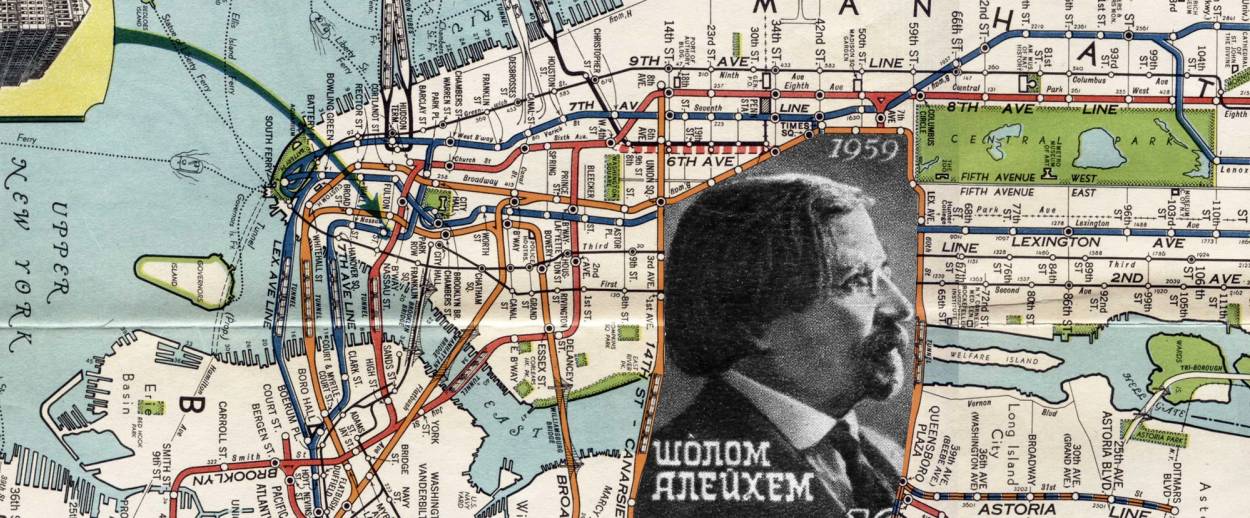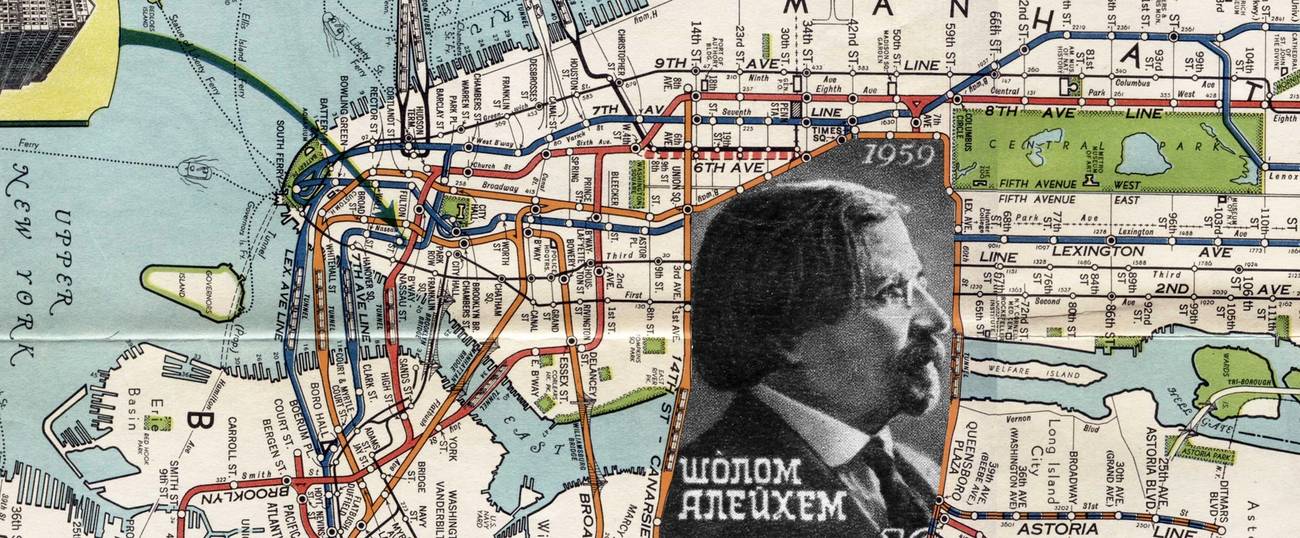Tevye Served Raw, Perchik Served Hot
Rokhl’s Golden City: Two Yiddish ‘Fiddlers’ and Funk-a-Deli




Somewhere on my computer there’s a folder no one is ever supposed to click on. Everyone has one. You know, the one labeled VEGAN RECIPES. Mine is just pictures of Yentl-era Mandy Patinkin in all his Ashkenazi bear glory. That beard. That smile. That gorgeous head of hair. Swoon. And yet. Even the promise of present-day, Homeland-era Mandy Patinkin presenting an award to my dear friend (and legendary Ashkenazi bear in training) Daniel Kahn at the recent Yiddish Under the Stars concert in Central Park couldn’t get me excited about going out after dark. Concert in the park? Getting eaten by bugs? Seeing every disappointing Jewish man ever to come across the JDate transom in the last 15 years? Oy.
What finally got me to the concert was a non-klez friend of mine who wanted to go. The prospect of Rokhl-splaining two and a half hours of my favorite music to someone who would actually listen (or, at least, couldn’t leave) was just too good to pass up. Which was a good thing, because we ended up having the most magical evening. The bands, most of whom I’ve seen many, many times, were terrific. I got tipsy on one beer. And we got a tantalizing taste of the Folksbiene’s new production of the Yiddish Fiddler on the Roof when they brought out their Fyedka for an electrifying snippet from the big “To Life” dance number.
One of the great flaws of the Fiddler movie, in my opinion, was the casting of Perchik. Not to be too hard on Paul Michael Glaser, bless his heart, but as Perchik he’s got all the sex appeal of room-temperature kugel. Perchik’s about to change the world! He just brought mixed dancing back! He has to smolder. Happily, in the most brilliant stroke of casting, Daniel Kahn will be playing Perchik in this Yiddish Fiddler and if there’s anyone who knows how to smolder in Yiddish, it’s Daniel. (And Mandy, always Mandy.) I’m also excited about the first (as far as I know) New York production of Yiddish Fiddler, something me and my Yiddishist friends have only known through the Israeli cast recording. The Yiddish Fiddler achieves a delicious specificity that the original songs, as wonderful as they are, can only hint at.
Part of the enduring success of Fiddler owes to the precise crafting of its onstage Yiddishkeit. Though it was quickly embraced by Jewish audiences, the vocabulary of Fiddler was created for audiences which, by and large, had no familiarity with the people or customs of the Old Country. Fiddler presented an Eastern European Jewishness that needed no translation and where foreign words were used, they were translated immediately: to life, to life/l’chaim.
Director Jerome Robbins was constantly battling original Broadway Tevye Zero Mostel because Mostel wanted to insert his own authentic improvisations, like kissing the onstage mezuzah. Robbins argued that for those who didn’t know what it meant, such a gesture, rather than adding anything, would be a confusing distraction. Though at times the de-Yiddishized Fiddler makes me wonder what might have been, the truth is, Robbins was right. The creators of Fiddler weren’t writing a translation of Sholem Aleichem’s Tevye stories, nor were they presenting an ethnographically faithful picture of life in the Pale of Settlement. First and foremost, they were men of the American musical theater, then at its shimmering peak of ingenuity. Though they were obviously inspired by the work of Sholem Aleichem, they couldn’t help but present a story by Americans, for Americans. To complain about its lack of fidelity to the real Tevye strikes even this humorless Yiddishist as churlish.
Which isn’t to say that the real Tevye isn’t relevant. I mean, there actually was a real Tevye, a guy who brought dairy to the dacha where Sholem Aleichem stayed. As much as Sholem Aleichem was a brilliant, sophisticated stylist, there’s a tremendous biographical element in his writing and, perhaps even more so, Solomon Rabinovich, the Russian-identified maskilic intellectual behind the writer’s persona, wanted to capture the world and the voices he himself had left behind and which he saw as disappearing. Tevye has always existed as a dialectic. Even when he was just a regular guy shlepping milk, he was already an idea. The tension between the many Tevyes brought me to my favorite kosher dosa restaurant last weekend to meet with two-thirds of the creators of the new show Tevye Served Raw, Shane Baker and Yelena Shmulenson. (Writer director performer Allen Lewis Rickman was otherwise occupied.)
As Shane and Yelena explained to me, Tevye Served Raw grew out of the trio’s participation in the annual Sholem Aleichem yahrzeit events, presenting new dramatic adaptations of his stories as part of the evening’s program. After a couple years digging deep into the archives (and sometimes even working from unpublished dramatic adaptations by Sholem Aleichem himself), they finally decided it was time to bring it all together for its own show.
If you’ve seen Fiddler you know that the romance between Chava and Fyedka blossoms as a connection between two readers. But what was the book Fyedka passed to Chava? In Tevye Served Raw, we learn that it was a volume of Gorky. Gorka, who’s this Gorka?, Tevye asks in his typically mangled manner. Chava reminds him that they have his picture, and that of Count Tolstoy, hanging in their house. This was news to me. However, the real Sholem Aleichem was a peer of Gorky and the real Gorky was a fan of Sholem Aleichem. Why wouldn’t the real Tevye have his own VEGAN RECIPES folder with pictures of Gorky? Now, if only he had known about Mandy Patinkin…
***
Listen: Mlotek Prize for Yiddish Continuity winner Daniel Kahn is playing a rare New York set with his band The Painted Bird June 26 at the JCC on the Upper West Side. … If you understand Yiddish, check out Folksbiene artistic director Zalmen Mlotek talking all things Fiddler on the Yiddish Voice Podcast. Get Dan’s new CD, The Butcher’s Share, here.
Watch: Dan will be playing Perchik the smoldering Yiddish revolutionary in the Folksbiene’s new Yiddish Fiddler, directed by Broadway legend Joel Grey. Starting July 5 at the Museum of Jewish Heritage. Tevye Served Raw is running concurrently with the Folksbiene’s Fiddler and you’re going to want to see them both.
Read: There’s a terrific new resource for all things Sholem Aleichem, the official Sholem Aleichem website.
ALSO: Wednesday June 20 my multitalented friend Zisl Slepovitch hosts an evening of Yiddish song and folklore, drawing on his deep experience in academic ethnography as well as his many years as a practitioner of new (and old) Yiddish song, at the Workmen’s Circle. … If you happen to be in Europe (lucky you) the acclaimed Krakow Jewish Culture Fest opens on June 22. … To bring everything full circle, Cleveland—hometown of my super-faves Mickey Katz and his son, Joel Grey—is hosting a free outdoor concert with Funk-a-Deli (formerly known as Yiddishe Cup) one of the only contemporary bands focusing on the songs of Mickey Katz. My old friend Michael Wex hosts, Sunday, June 24. … Emigrantski Raggamuffin Kollektiv: Rot Front brings their eclectic Berlin klez reggae fusion to New York (finally!) on June 29, at Drom. … You can now see the livestream of the Elaine Hoffman-Watts memorial concert here. … The good folks at Yiddish Farm make the best damn matzo I’ve ever tasted. You can order their new honey cookies (honig kikhelekh) online or visit the Yiddish Farm folks at their regular spot at the Riverdale Y on Sundays.
Rokhl Kafrissen is a New York-based cultural critic and playwright.